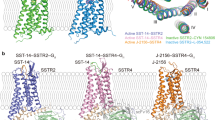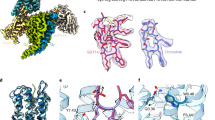Abstract
Three human breast cancer cell lines ZR-75-1, MDA-MB-436 and MCF-7 were found to contain respectively, 3.06, 2.69 and 1.86 fmol of somatostatin-like immunoreactivity (SLI) per 10(6) cells. Since SLI is undetectable in the passaging media it must, therefore, be synthesised by the cells. In the presence of fetal calf serum the cells were growth inhibited by addition of somatostatin or its long-lasting analogue, Sandostatin, but only after 3 days of continuous exposure. A 1-day exposure to either peptide had little or no effect on subsequent cell growth in peptide-free medium. Inhibition of cell proliferation is not due to cytotoxic effects of the dose used (500 ng ml-1, each) since both peptides caused short-term stimulation of growth in the absence of serum.
This is a preview of subscription content, access via your institution
Access options
Subscribe to this journal
Receive 24 print issues and online access
$259.00 per year
only $10.79 per issue
Buy this article
- Purchase on Springer Link
- Instant access to full article PDF
Prices may be subject to local taxes which are calculated during checkout
Similar content being viewed by others
Author information
Authors and Affiliations
Rights and permissions
About this article
Cite this article
Nelson, J., Cremin, M. & Murphy, R. Synthesis of somatostatin by breast cancer cells and their inhibition by exogenous somatostatin and sandostatin. Br J Cancer 59, 739–742 (1989). https://doi.org/10.1038/bjc.1989.154
Issue Date:
DOI: https://doi.org/10.1038/bjc.1989.154
This article is cited by
-
Colocalization of somatostatin receptors and epidermal growth factor receptors in breast cancer cells
Cancer Cell International (2006)
-
Somatostatin receptors in primary human breast cancer: quantitative analysis of mRNA for subtypes 1–5 and correlation with receptor protein expression and tumor pathology
Breast Cancer Research and Treatment (2005)
-
Treatment of Metastatic Breast Cancer With Somatostatin Analogues?A Meta-Analysis
Annals of Surgical Oncology (2001)



